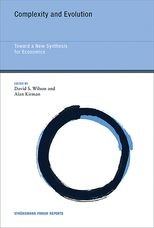 Complexity and Evolution: Toward a New Synthesis for Economics
Complexity and Evolution: Toward a New Synthesis for Economics
Contents
-
-
-
-
-
-
-
-
-
-
-
-
Introduction Introduction
-
Which Past? Which Past?
-
The “Long-Term-Time” Perspective: 600 BC–AD 1950 The “Long-Term-Time” Perspective: 600 BC–AD 1950
-
A Framework for the Study of Socioenvironmental Dynamics A Framework for the Study of Socioenvironmental Dynamics
-
Observing This Process in the Real World Observing This Process in the Real World
-
Epirus 1850–1995 Epirus 1850–1995
-
Adaptedness and Stability Adaptedness and Stability
-
Disruption Disruption
-
Transformation Transformation
-
Readaptation Readaptation
-
Summary Summary
-
-
The Role and Importance of a Society’s “Value Space” The Role and Importance of a Society’s “Value Space”
-
Is Our Current “Value Space” a Constraint? Is Our Current “Value Space” a Constraint?
-
Is There a Way Out? Is There a Way Out?
-
Green Growth Green Growth
-
Reframing Our Efforts Reframing Our Efforts
-
-
-
-
-
-
-
-
-
13 Adaptation and Maladaptation in the Past: A Case Study And Some Implications
Get access-
Published:August 2016
Cite
Abstract
Adaptation and maladaptation are best viewed as different phases in the relationship between a society and its (social and natural) environment. This chapter looks at that relationship over two scales (millennial and centennial) and attributes the transitions (“tipping points”) between adaptation and maladaptation to the unintended consequences of human actions. These, in turn, are due to the difference in dimensionality between the environment and humans’ perception of it. Transitions between adaptation and maladaptation occur when a society’s “value space” (i.e., the total set of values that the society knows, which keep that society functionally together) does not expand at a sufficient pace to keep up with the growth of the society’s population. This chapter argues that this is the case in the current, western-dominated global system, and suggests that an inversion of global information flows (i.e., spreading information rather than concentrating it in the West) has the potential to reenergize the global economic system. This needs to be achieved while respecting the environment, hence the term green growth. It implies rephrasing the current economic and political debates from “burden sharing” to “opportunity creation,” both for the developing and for the developed world.
Sign in
Personal account
- Sign in with email/username & password
- Get email alerts
- Save searches
- Purchase content
- Activate your purchase/trial code
- Add your ORCID iD
Purchase
Our books are available by subscription or purchase to libraries and institutions.
Purchasing information| Month: | Total Views: |
|---|---|
| October 2022 | 2 |
| November 2022 | 1 |
| December 2022 | 2 |
| July 2023 | 3 |
| April 2024 | 2 |
| June 2024 | 1 |
| August 2024 | 1 |
| September 2024 | 1 |
| November 2024 | 5 |
| March 2025 | 2 |



Get help with access
Institutional access
Access to content on Oxford Academic is often provided through institutional subscriptions and purchases. If you are a member of an institution with an active account, you may be able to access content in one of the following ways:
IP based access
Typically, access is provided across an institutional network to a range of IP addresses. This authentication occurs automatically, and it is not possible to sign out of an IP authenticated account.
Sign in through your institution
Choose this option to get remote access when outside your institution. Shibboleth/Open Athens technology is used to provide single sign-on between your institution’s website and Oxford Academic.
If your institution is not listed or you cannot sign in to your institution’s website, please contact your librarian or administrator.
Sign in with a library card
Enter your library card number to sign in. If you cannot sign in, please contact your librarian.
Society Members
Society member access to a journal is achieved in one of the following ways:
Sign in through society site
Many societies offer single sign-on between the society website and Oxford Academic. If you see ‘Sign in through society site’ in the sign in pane within a journal:
If you do not have a society account or have forgotten your username or password, please contact your society.
Sign in using a personal account
Some societies use Oxford Academic personal accounts to provide access to their members. See below.
Personal account
A personal account can be used to get email alerts, save searches, purchase content, and activate subscriptions.
Some societies use Oxford Academic personal accounts to provide access to their members.
Viewing your signed in accounts
Click the account icon in the top right to:
Signed in but can't access content
Oxford Academic is home to a wide variety of products. The institutional subscription may not cover the content that you are trying to access. If you believe you should have access to that content, please contact your librarian.
Institutional account management
For librarians and administrators, your personal account also provides access to institutional account management. Here you will find options to view and activate subscriptions, manage institutional settings and access options, access usage statistics, and more.